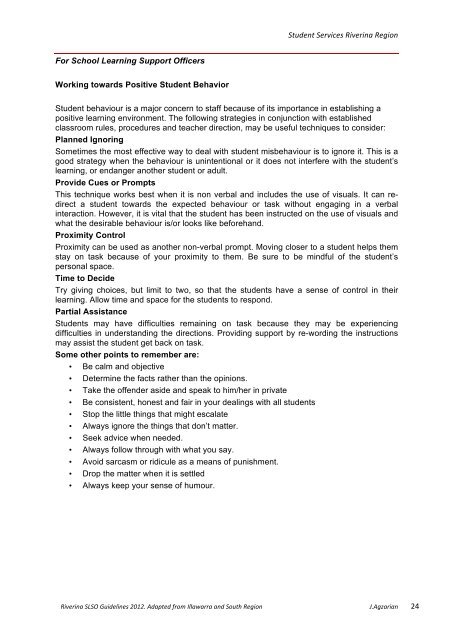A Resource for Teachers and School Learning Support Officers
A Resource for Teachers and School Learning Support Officers - Back
A Resource for Teachers and School Learning Support Officers - Back
You also want an ePaper? Increase the reach of your titles
YUMPU automatically turns print PDFs into web optimized ePapers that Google loves.
Student Services Riverina Region <br />
For <strong>School</strong> <strong>Learning</strong> <strong>Support</strong> <strong>Officers</strong><br />
Working towards Positive Student Behavior<br />
Student behaviour is a major concern to staff because of its importance in establishing a<br />
positive learning environment. The following strategies in conjunction with established<br />
classroom rules, procedures <strong>and</strong> teacher direction, may be useful techniques to consider:<br />
Planned Ignoring<br />
Sometimes the most effective way to deal with student misbehaviour is to ignore it. This is a<br />
good strategy when the behaviour is unintentional or it does not interfere with the student’s<br />
learning, or endanger another student or adult.<br />
Provide Cues or Prompts<br />
This technique works best when it is non verbal <strong>and</strong> includes the use of visuals. It can redirect<br />
a student towards the expected behaviour or task without engaging in a verbal<br />
interaction. However, it is vital that the student has been instructed on the use of visuals <strong>and</strong><br />
what the desirable behaviour is/or looks like be<strong>for</strong>eh<strong>and</strong>.<br />
Proximity Control<br />
Proximity can be used as another non-verbal prompt. Moving closer to a student helps them<br />
stay on task because of your proximity to them. Be sure to be mindful of the student’s<br />
personal space.<br />
Time to Decide<br />
Try giving choices, but limit to two, so that the students have a sense of control in their<br />
learning. Allow time <strong>and</strong> space <strong>for</strong> the students to respond.<br />
Partial Assistance<br />
Students may have difficulties remaining on task because they may be experiencing<br />
difficulties in underst<strong>and</strong>ing the directions. Providing support by re-wording the instructions<br />
may assist the student get back on task.<br />
Some other points to remember are:<br />
• Be calm <strong>and</strong> objective<br />
• Determine the facts rather than the opinions.<br />
• Take the offender aside <strong>and</strong> speak to him/her in private<br />
• Be consistent, honest <strong>and</strong> fair in your dealings with all students<br />
• Stop the little things that might escalate<br />
• Always ignore the things that don’t matter.<br />
• Seek advice when needed.<br />
• Always follow through with what you say.<br />
• Avoid sarcasm or ridicule as a means of punishment.<br />
• Drop the matter when it is settled<br />
• Always keep your sense of humour.<br />
Riverina SLSO Guidelines 2012. Adapted from Illawarra <strong>and</strong> South Region J.Agzarian 24


